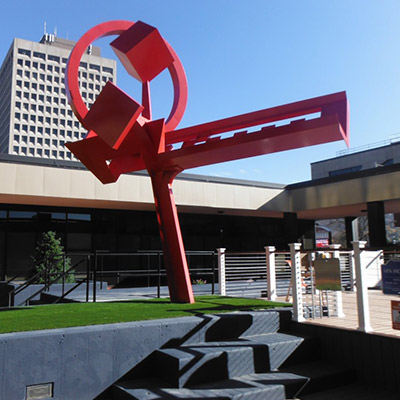By George Basler
Forsaken of Man has been described as “forceful,” “dramatic” and “the 20th century St. Matthew’s Passion,” referring to Bach’s sacred music masterpiece.
Composed in 1939, the 65-minute cantata is the work of Leo Sowerby, a composer, organist and teacher who was called “the dean of American church music” in the early to-mid 20th century.
The choral work for soloists, chorus and organ musically tells the Christian Passion story of Easter week. Its libretto generally follows the Gospel of St. Matthew’s account, with liberal interpretations from the other three gospels.
Southern Tier residents will get to hear the piece on Sunday (April 3) when the Trinity Memorial Church Choir joins with the Madrigal Choir of Binghamton to perform the cantata at 6 p.m. at Trinity Memorial Episcopal Church, 44 Main St., Binghamton. There is no admission fee, but a free-will offering will be accepted.
Forsaken of Man is a major work that has “gorgeous melodies and also some choruses that are hair-raising and exciting,” said Tim Smith, organist and choirmaster at Trinity Memorial.
Forty-five singers, including eight soloists, will perform the piece, accompanied by organ virtuoso William Trafka, former music director of St. Bartholomew’s Church in New York City and director, for 22 years, of the St. Bartholomew’s Summer Festival of Sacred Music.
One reason for the performance is that Smith is “a big fan” of Sowerby’s music, said Bruce Borton, artistic director of the Madrigal Choir. Another reason is because “we feel it’s a piece that deserves to be known more and performed more.”
Sowerby’s long career featured more than 500 pieces in every genre except opera and ballet. His compositions combined melodic talent with the use of modern harmonies and provided a transition between 19th and 20th century American church music. Sowerby’s honors include the prestigious Rome Prize from the American Academy of Rome (he was the first American winner), and the 1946 Pulitzer Prize for Music for his cantata Canticle of the Sun.
Forsaken of Man, while appropriate for the Christian season of Lent, is first and foremost a musical composition by “an accomplished American composer whose work is not known by as many people as it should be,” Borton said.
Sowerby collaborated on Forsaken of Man with Edward Borgers, who wrote the libretto. The two were long-time friends who met when Borgers was a 19-year-old student at the University of Chicago. They produced two cantatas together, with Borgers writing the librettos and Sowerby composing the music
Forsaken of Man is divided into four parts, with a brief prologue and epilogue. The eight soloists sing the characters in the Passion Play, including Jesus, Judas and Pontius Pilate. The full choir takes on the character of the crowd. Another character, The Evangelist, comments on the action while organ passages provide transitions between the scenes.
Sowerby had his hand in both sacred music and jazz music (he wrote two pieces for Paul Whiteman’s orchestra), so Forsaken of Man “reflects not only American sacred music, but also American jazz harmonies,” Smith noted.
The piece is “a stunning work” that includes “parts that are downright gorgeous,” as well as dissident chords in keeping with the somber story line, added Jean Henssler, rehearsal accompanist for the Madrigal Choir.
At the same time, it’s a demanding piece to perform, she noted. Smith and Borton agreed that it’s a difficult and complex work for both choir and organist. That’s a major reason that it is not performed more, they said.
“This is not a piece you can put together with a couple of rehearsals,” Borton noted. The choirs have been rehearsing for six weeks to get ready.
As demanding as the piece is, it’s also rewarding, Borton said. The combination of the music and the words of the story make it a “beautiful piece,” he noted, adding: “I like a strong text well set by a composer.”
IF YOU GO: Forsaken of Man will be performed by the combined choirs of Trinity Memorial Church and the Madrigal Choir of Binghamton at 6 p.m. Sunday (April 3) at Trinity Memorial Episcopal Church, 44 Main St., Binghamton. There is no admission fee, but a free-will offering will be accepted.
.




































